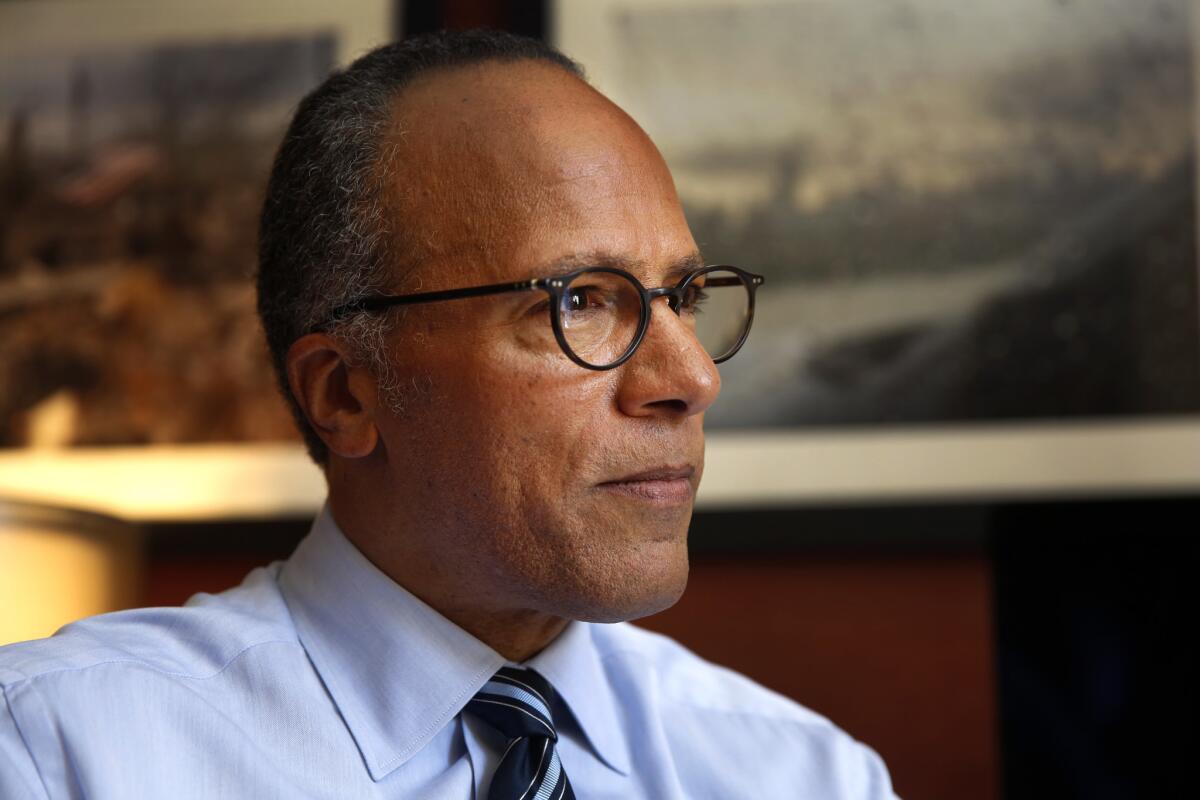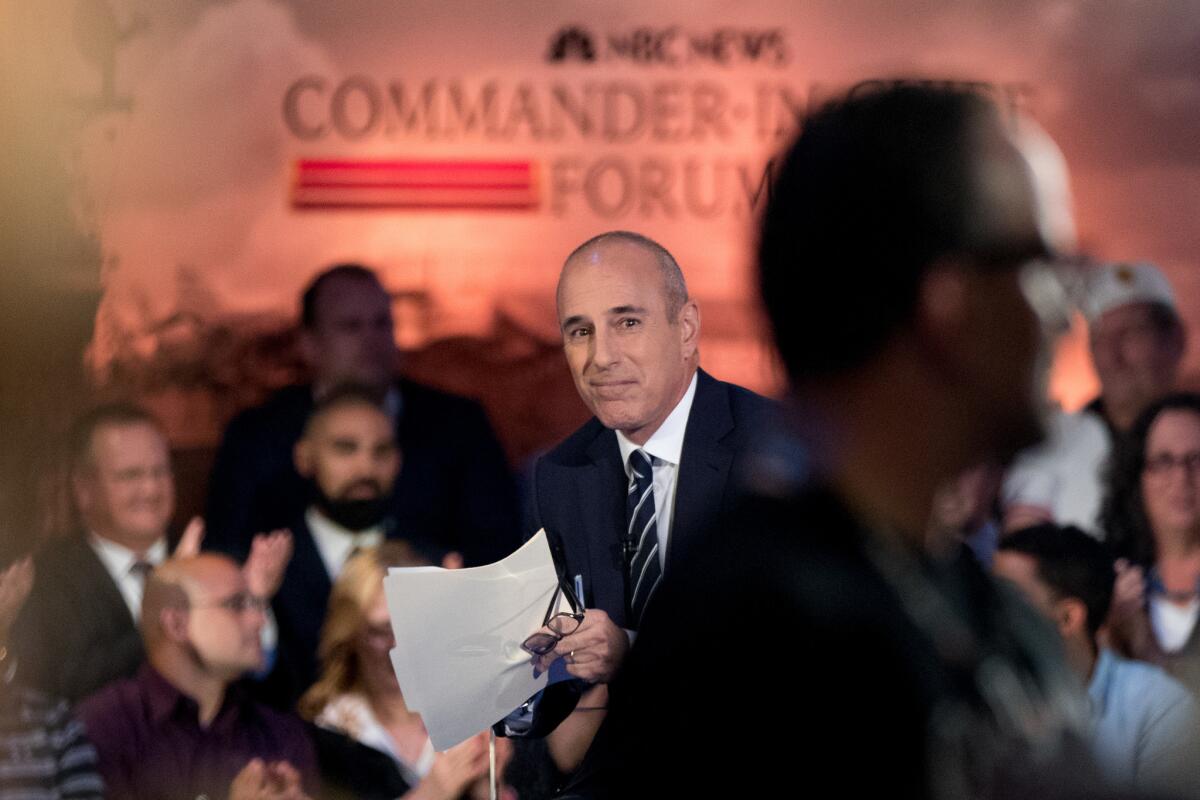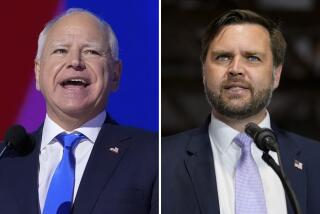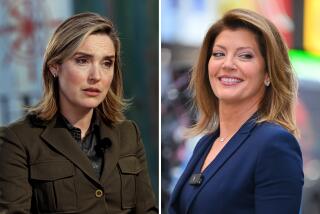Commentary: Why TV news needs to pull itself together for the Trump-Clinton presidential debates

“NBC Nightly News” anchor Lester Holt in his New York office.
Once more unto the breach, Lester Holt, once more.
For the second time in less than two years, the eyes of the world are upon the former “Dateline” host. Tapped to step in for and then replace Brian Williams last year after the dethroned NBC news anchor was caught choosing self-promotion over the truth, Holt, as moderator of the first debate between Hillary Clinton and Donald Trump, now has an even more formidable task: Return television coverage of the 2016 presidential campaign to something approaching sanity.
For the record:
1:20 p.m. Sept. 25, 2016An earlier version of this post stated that Monday’s presidential debate would start at 6 p.m. Eastern time. That is the start time on the West Coast. The debate begins at 9 p.m. Eastern.
No matter who is or isn’t sittingin the front row.
Even before Trump pulled some signature histrionics — after long-time foe Mark Cuban announced he’d gotten choice seats for Monday night’s debate, Trump tweeted Saturday that he might invite Gennifer Flowers — Holt was stepping into a mess made by another network colleague.
For reasons known only to NBC, “Today” host Matt Lauer was asked to moderate the first (and presumably last) “Commander in Chief Forum” earlier this month, and his performance was an unmitigated disaster. In separate 30-minute interviews, Lauer’s repeated interruptions of Hillary Clinton and quantifiably less intense questioning of Donald Trump didn’t just dent his own reputation, it once again moved the spotlight away from voter issues and onto the media.

Both Clinton and Trump immediately attempted to leverage his performance to their advantage. Clinton made Lauer the center of next-day fundraising. Trump, who said Lauer did a great job, announced that if Holt or any other moderators were tougher on him, it would prove that the fix was in.
Once again the moderators, rather than the candidates, were the main topic of conversation.
In this presidential race, the media has become the message, and at a time when it can least afford to be.
This, for the record, is not entirely Matt Lauer’s fault.
Accusations of political bias, accurate and not, have been made against the media since some prehistoric artist made one tribe member look bigger than the rest on the cave wall and another cried “rigged.”
Televised political coverage, the way most people get to know the candidates, is always dinged during a campaign — for being too liberal, too conservative, too gullible, too cynical, too worried about ratings.
But this time around, everything’s different, and more than a little crazy, especially on television.
This time around, while commentators and critics fretted about Trump’s willingness to blur politics and entertainment in the Republican presidential debates, the news networks leveraged a ratings boom and then gave in to candidate boycott threats over format demands.
This time around, we watched as Trump orchestrated a campaign of abuse against Fox News anchor Megyn Kelly after the first Republican debate, when she asked him about his attitude toward women. He later demanded that Fox News cut her from its second debate, and when the network refused, he skipped it.
This time around, we also watched as Kelly responded by asking Trump to join her on a highly touted Fox News special (during which their “showdown” turned out to be, essentially, a plug for her new book). And we watched as CNN hired Trump’s fired campaign manager Corey Lewandowski as a commentator, even though he’d signed a nondisclosure agreement with — and was still receiving severance pay from — the Trump campaign.
And as we watch Monday’s debate, it will be with the knowledge that the male candidate’s debate prep was, in part, provided by Roger Ailes, the former Fox News chairman who was just ousted over charges of sexual harassment.
But mostly we will be watching to make sure it is fair.
As the spectacle has gotten wilder, the critical echo chamber over the “fairness” of “the media” (two large and hard-to-define terms) has become such an emotional, divisive and central part of the campaign that many television journalists seem to not know what to do.
As in, they no longer know what their jobs actually entail.
After Lauer was criticized for letting Trump claim, once again and untruthfully, that he had always opposed the invasion of Iraq, MSNBC’s Chris Matthews defended his peer. If Lauer had pointed out the discrepancy between what Trump was saying now and what he had said then, Matthews said, Lauer would be calling Trump a liar, which would have sounded like an opinion, and moderators are not allowed to have opinions.
That’s how bad it’s gotten.
Someone with Matthews’ experience in the world of political journalism now apparently believes that questioning a statement known to be false is the same as offering an opinion.
And, for the record, this is not Chris Matthews’ fault either.
From the beginning, the circus-like nature of this campaign has defied all traditional rules and regulations, including how it plays on television.
On one side we had an odds-on-favorite and potential history maker blindsided by, of all things, a sudden burst of latent socialism.
On the other was a Republican race so crowded and personally acrimonious it often seemed like a joke.
The news media did not know what hit it.
When Clinton and Trump became the nominees, TV journalists found themselves stuck between one candidate with a long habit of evasion and another who, having sworn to defend the 2nd Amendment simply ignores the 1st. Clinton may limit her interviews, but Trump has stripped major news organizations of their press credentials, called on supporters to throw reporters out of events and cried “rigged” before any major interview or debate.
Clinton supporters, meanwhile, became vocal over perceived sexism, while Trump supporters rebelled against what they consider the media “elite.” Between the two, spot-the-bias replays have become the new national pastime, with charges of “false equivalency” and arguments over the need for real-time fact-checking during televised events.
But the presidential debates are far too important to get wigged out about the mean things some people are saying about you on Twitter. It’s time the television news media pulled itself together.
Circus-like or not, this is a presidential campaign, and a debate moderator’s job may be tough, but it really is not complicated. He or she is there to help provide the voters with actual information about the candidates by asking tough questions and demanding actual answers from each nominee in a way that is neither deferential nor acrimonious.
Quibbling is a distraction, but If a candidate is standing there lying his or her face off, there are a million ways a skilled moderator can make that clear without offering an “opinion.”
Fortunately, no one is better equipped to get things back on track than Holt.
After surviving even the goriest segments of “Dateline’s” true-crime bent with his low-key persona and integrity intact, he surprised everyone when he was brought on as the “NBC Nightly News” sub by getting even better numbers than the suave yet folksy Williams. Holt proved that “trustworthy anchor” is brand enough, without getting all self-aggrandizing and late-night about it.
Which is exactly what he needs to do Monday. We don’t need any drama. We have had enough drama. Now, we just need some answers.
“Presidential Debate”
When: 9 p.m. Eastern (6 p.m. PT), Monday
Where: KCBS; KNBC; KTLA; KABC; KTTV; KCAL; KOCE; KPBS; Bloomberg; CNBC; CNN; CSPAN; CSPAN2; Fox Business; Fox News; MSNBC
Rating: TV-G (suitable for all ages)
More to Read
The complete guide to home viewing
Get Screen Gab for everything about the TV shows and streaming movies everyone’s talking about.
You may occasionally receive promotional content from the Los Angeles Times.







